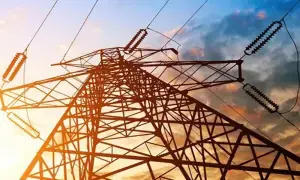Functioning ‘nervous system’ a must for Pakistan: economist Atif Mian
3 min readEconomist Atif Mian has stressed the need for having a well-functioning decision-making process – a nervous system for development – that formulates and guides economic policy in Pakistan.
“Unfortunately, Pakistan did not have a nervous system to make the right decisions - for things to change, the country must build a functioning nervous system,” he said in a long post on X on Sunday.
People in the South Asian country have received exorbitant electricity bills after the government increased tariffs and imposed taxes.
Many experts have blamed the past governments for agreements signed with the independent power producers (IPPs), saying that the terms of the pact were not appropriate for the country.
Mian, who has co-authored House of Debt, stated that he was concerned when Pakistan announced a $33 new energy policy a decade ago. The country borrowed the amount in dollars, with sovereign guarantees, to get (mostly) fossil-fuel based power plants built.
He admitted that the country needed electricity for its growing domestic needs, but wondered could it afford.
The Pakistani-American economist was of the view that some simple diagnostics should have been run before embarking on a project of this magnitude.
Below are some questions he raised
-
How will the country pay back the principal plus profit in dollars when electricity revenue would be largely rupee based?
-
What if the price of oil goes up, or there is external balance of payment pressure?
-
Wouldn’t the additional external debt burden make such “sudden stop” scenarios more likely?
-
Wouldn’t that crowd out private investment, and lower GDP growth?
-
What if GDP projections are off, wouldn’t the fixed capacity payments make the whole pricing system unsustainable?
-
What about alternative ways of designing an energy policy that harnesses domestic resources and builds domestic value chains for renewables?
“Today Pakistan is under extreme financial pressure, and it has one of the highest cost of electricity in the world. Households are paying about 21 cents per Kwh - in neighboring India the price is about nine cents. Even at 21 cents per Kwh, the energy sector is barely financial sustainable, as the country struggles with circular debt,” Mian said.
The Princeton University professor stated that there are about $2 billion of delayed dividend payments owed to foreign power plant investors. At such a high cost, he stated that a “kind of doom-loop” has set in, the higher the price, the lower the demand, which further raises the average cost per unit given the fixed capacity payments promised to power producers.
Also, read this
Govt proposes amendments to legalize ‘revenue-based load shedding’ in Pakistan
Payments to IPPs being ‘hyped up’, says state finance minister
He added that as the country struggles to pay dividends abroad, the exchange rate devalues, which only makes the problem worse.
“The sad reality of Pakistan’s energy woes is that the system was designed to fail. It’s fashionable these days to talk about capacity payments and the like. But all the major faults should have been visible a decade ago when such decisions were being made,” the economist said.
For the latest news, follow us on Twitter @Aaj_Urdu. We are also on Facebook, Instagram and YouTube.


























Comments are closed on this story.